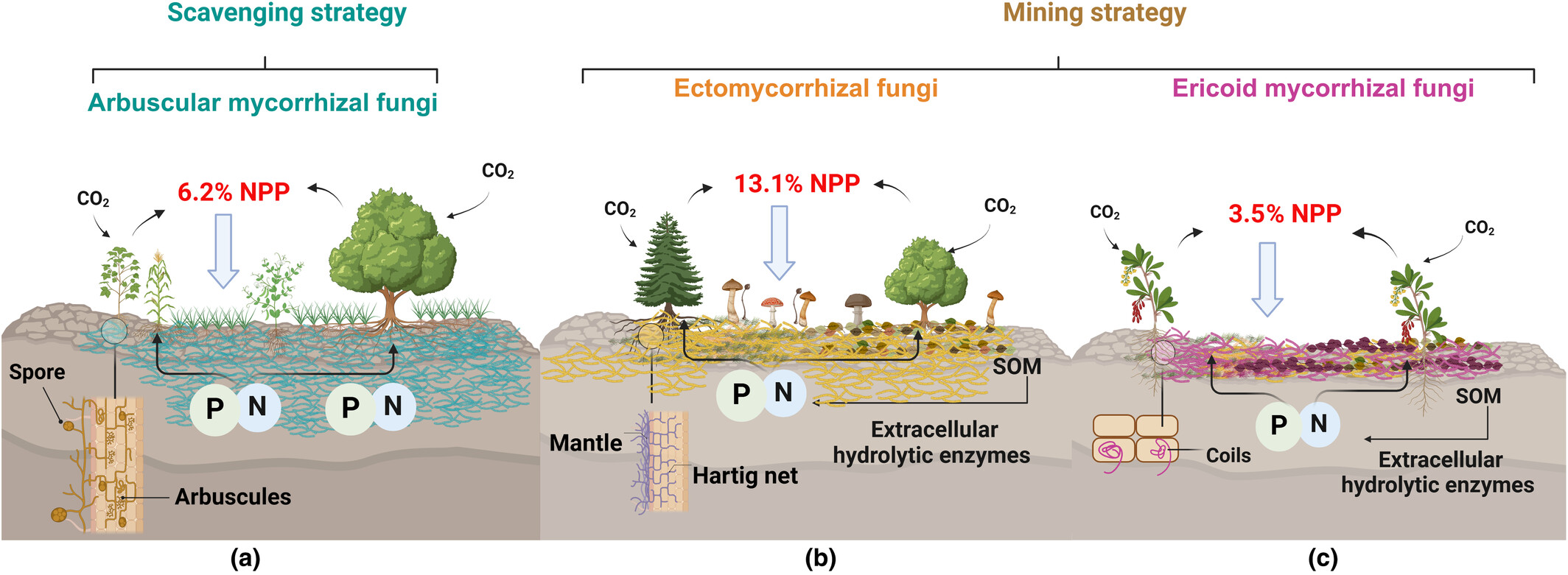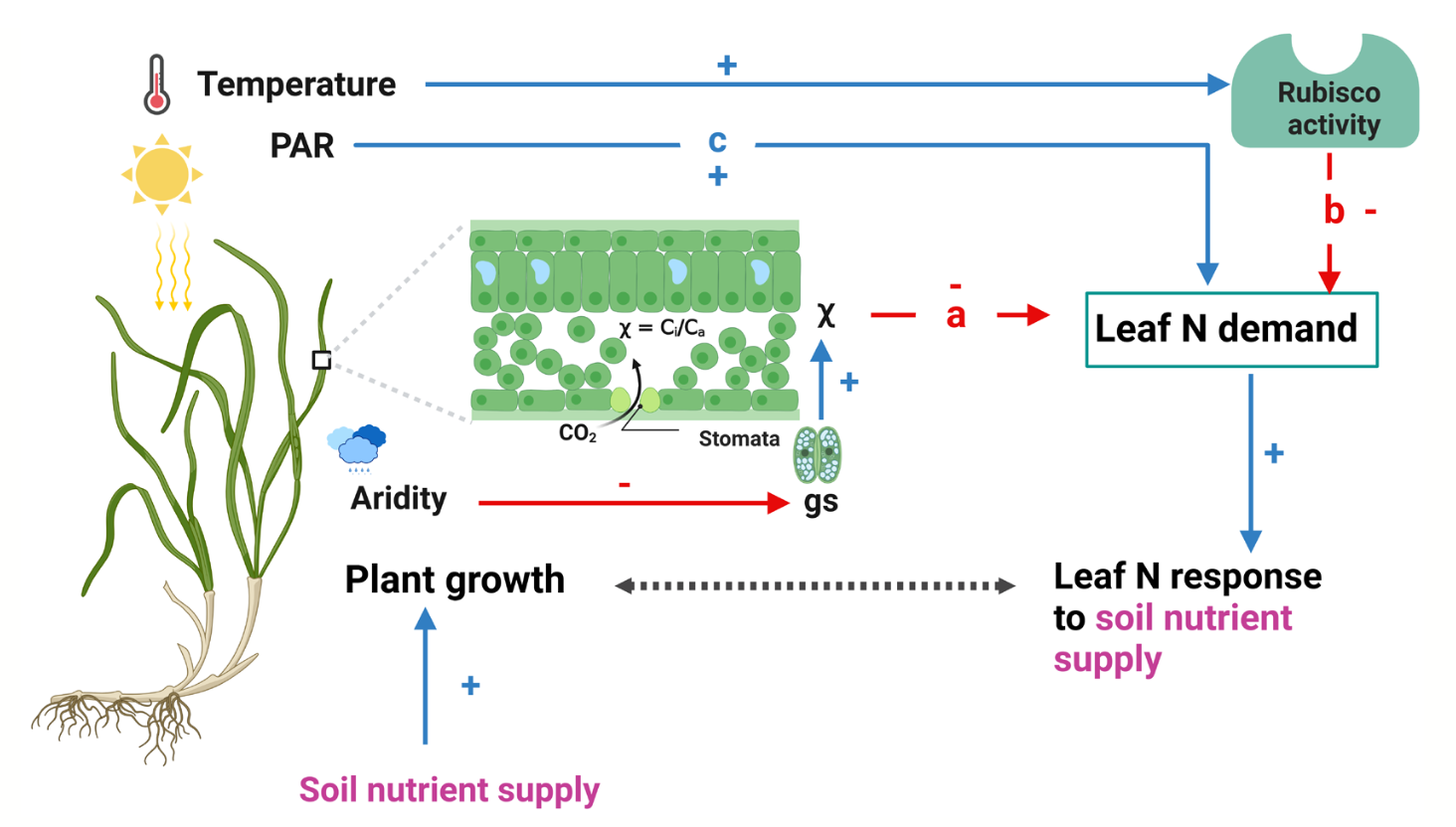Smith Lab News
Jul. 3, 2025: The lab has been publishing a lot this year!
The lab has been cranking out some cool publications and I (Nick) have been behind
on highlighting them here! So, please enjoy some quick highlights below. As always,
the full list of lab publications can be found on the publications
page.
Nitrogen demand, availability, and acquisition strategy control plant responses to elevated CO2
Evan led a complex multifactor experiment showing that elevated CO2 consistently decreases
leaf photosynthetic capacity across 18 levels of nutrient availability.
This finding shows support for optimal photosynthetic downregulation that
is independent of nutrient availability. This experimental work corroborates
theoretical
and large scale
analyses.

Perkowski, EA*, E Ezekannagha*, and NG Smith* (2025). Nitrogen demand, availability, and acquisition strategy control plant responses to elevated CO2. Journal of Experimental Botany 76(1): 2908-2923. link.
C4 photosynthesis, trait spectra and the fast-efficient phenotype
Russ Monson led a New Phytologist Tansley Review examining trait relationships in C4 plants. The paper shows that C4 plant occasionally act like their C3 cousins, but occasionally do not! We propose calling their phenotype both fast and efficient! See more about what we mean in the paper linked below.

Monson, R, S Li, L Ainsworth, Y Fan, J Hodge, A Knapp, A Leakey, D Lombardozzi, S Reed, R Sage, M Smith, NG Smith*, C Still, and D Way (2025). C4 photosynthesis, trait spectra and the fast-efficient phenotype. New Phytologist 246(3): 879-893. link.
Thermal acclimation of stem respiration implies a weaker carbon-climate feedback
Zhang Han from Wang Han's group at Tsinghua University led a fantastic article examining thermal acclimation of stem respiration that was published in Science. The paper provides a theoretical quantification of stem thermal acclimation and tests it with data (including some from Nick's PhD!). We then explore the consequences for the carbon cycle when the acclimation response is included in models.

Han, Z, H Wang, IJ Wright, IC Prenctice, SP Harrison, NG Smith*, A Westerband, L Rowland, L Plavcova, H Morris, PB Reich, S Jansen, and TF Keenan (2025). Thermal acclimation of stem respiration implies a weaker carbon-climate feedback. Science 388(6750): 984-988. link.
Deciphering the variability of leaf phosphorus-allocation strategies using leaf economic traits and reflectance spectroscopy across diverse forest types
Tingting Dong from Zhengbing Yan's group at CAS led a New Phytologist paper examining variability in leaf phosphorus allocation across different forest types, as well as the use of spectroscopy to determine these fractions. The paper finds variability across the LES spectrum as well as across the different forest types. Monika Kelley here at TTU will be examining some of these relationships experimentally as part of her PhD.

Dong, T, F Wu, Y Tsujii, P Townsend, N Yang, W Xu, S Liu, N Swenson, J Lamour,
W Han, NG Smith*, Y Shi, L Yan, D Tian, M Jiang, Z Wang, X Liu, G Dai, J Dong,
J Sardans, PB Reich, H Lambers, SP Serbin, J Peñuelas, J Wu, and Z Yan (2025).
Deciphering the variability of leaf phosphorus-allocation strategies using
leaf economic traits and reflectance spectroscopy across diverse forest types.
New Phytologist 247(3): 1129-1144.
link.
Dominant species predict plant richness and biomass in global grasslands
Pengfei Zhang led a collaborative paper in Nature Ecology & Evolution using
grassland dat (including data from the Nutrient Network data) to show that
dominant species determine species richness, while the absolute abundance of those species
determines community biomass. We were also able to show that this followed mathematical
expectations. Another fun NetNet-related collaboration!

Zhang, P, EW Seabloom, J Foo, A MacDougall, SW Harpole, P Adler, Y Hautier, N Eisenhauer, M Spohn, J Bakker, Y Lekberg, A Young, C Carbutt, A Risch, P Peri, NG Smith*, C Stevens, S Prober, J Knops, G Wardle, CR Dickman, A Ebeling, C Roscher, H Martinson, JP Martina, SA Power, Y Niu, Z Ren, G Du, R Virtanen, P Tognetti, M Tedder, A Jentsch, J Catford, and EA Borer (2025). Dominant species predict plant richness and biomass in global grasslands. Nature Ecology & Evolution 9: 924-936. link.
Temporal constraints on leaf-level trait plasticity for next-generation land surface models
Astrid Odé from Hugo de Boer's lab at Utrecth University led a paper in Annals of Botany exploring the different temporal responses of photosynthetic processes, from near instantaneous to evolution time scales. The paper was part review and part modeling exercise to explore the interaction between responses across timescales. These timescales are critical to narrow down for predictive modeling and this paper provides an avenue for dealing with them.

Odé, A, NG Smith*, KT Rebel, and HJ de Boer (In Press).
Temporal constraints on leaf-level trait plasticity for next-generation land surface models.
Annals of Botany.
link.
Jul. 1, 2025: "Echoes of Guadalupe" a new documentary on floral diversity work in the Guadalupe Mountains National Park
The video highlights our work in the Guadalupe Mountains National Park where
we are resampling the flora that was originally sampled over 50 years ago when the
park was established. The work is being led by PhD student Madison Bullock (Johnson Lab; TTU).
The sampling allows us to quantify genetic and trait responses across time, during which
the park has experienced unprecedented change, through changes in climate, atmospheric gas
composition, and land use. Check it out!
P.S. Apologies for the "um's"!
Mar. 24, 2025: Alissar, Evan, and Jeff led a new paper published in New Phytologist titled “Soil resource acquisition strategy modulates global plant nutrient and water economics”

Plants need resources like nutrients and water to grow, and they adopt different
strategies to acquire these resources from the soil. However, acquiring nutrients
comes at a cost—plants must invest carbon belowground to support root systems and
microbial partnerships. But how do these costs change depending on soil conditions,
water availability, and plant nutrient-acquisition strategies? And how are these
costs coupled with photosynthetic acclimation processes?
In this new study, we tackled these questions using a global dataset of leaf carbon
isotopes, spanning a wide range of plant species and environmental conditions.
By applying an eco-evolutionary optimality framework
(Harrison et al., 2021;
Franklin et al., 2020)
that links soil resources to leaf-level photosynthetic
acclimation, we estimated the carbon costs of acquiring nutrients relative to
water and uncovered key patterns.
The findings reveal that these costs decrease as soil nitrogen availability increases
but increase with increasing moisture—yet this pattern depends on how plants acquire
nutrients (Figure 1; see below).
Specifically, plants associated with arbuscular mycorrhizal
fungi experience lower costs when inorganic soluble nitrogen is abundant, as these
fungi efficiently scavenge soluble inorganic nitrogen. In contrast, plants associated
with ectomycorrhizal and ericoid fungi experience lower costs in nitrogen-poor soils,
where these fungi can break down organic matter using specialized enzymes.
Moisture plays a different role. Our study found that the carbon costs of
acquiring nutrients relative to water increase with higher moisture levels,
but mainly for plants relying on arbuscular mycorrhizal fungi. This suggests
that for these plants, wetter conditions directly influence the cost of maintaining
transpiration, altering their carbon investment strategies. Finally, the modulation
of these costs by phosphorus availability depended on the indirect effects of
moisture on soil phosphorus. Interestingly, the effects vary by biome. In tropical
and subtropical ecosystems, both moisture and nitrogen availability shape these costs.
However, in temperate and boreal regions, where nitrogen is the primary limiting
factor for growth, only soil nitrogen availability plays a key role.
This study highlights that plants minimize resource acquisition costs in a
predictable way, balancing trade-offs between water and nutrients depending
on their environment and strategy. These findings emphasize the need to
refine Earth System Models using optimality theory to better integrate how
plants adjust their carbon investments in response to resource availability.
Cheaib, A*, J Chieppa*, EA Perkowski*, and NG Smith* (In Press).
Soil resource acquisition strategy modulates global plant nutrient and water economics.
New Phytologist.
link.
Jan. 19, 2025: Alissar, Lizz, Evan, and Risa lead paper showing that leaf nitrogen demand helps determine leaf nitrogen responses to soil nitrogen, out now in Ecology Letters
Alissar led a
new study published in Ecology Letters titled “Soil nitrogen supply
exerts largest influence on leaf nitrogen in environments
with the greatest leaf nitrogen demand."

The paper uses leaf chemistry data (Firn et al., 2019) from the Nutrient Network to show that sites that have the greatest leaf nitrogen response to soil nitrogen fertilization are those where we would expect there to be the greatest demand for photosynthetic leaf nitrogen.
From theory (see review by Stocker et al. (2024)) we can predict how climatic factors should drive photosynthetic leaf nitrogen demand. This theory predicts that leaf nitrogen demand should increase with aridity and sunlight, and decrease with temperature. The new paper shows that the responsiveness of leaf nitrogen to soil nitrogen across the network increases with these factors (see figure below).
This study provides a novel confirmation of our theoretical understanding of plant nitrogen dynamics. This can serve as a baseline for developing new models (e.g., Stocker et al. (2024)) for simulating these responses, ultimately improving simulations of terrestrial carbon-nitrogen cycle interactions.
As an aside, it is with pleasure to note that this paper was the result of many years of work by the PhUnFETTy lab and our collaborators within the NutNet. The first four authors are current or former PhUnFETTy lab members, all of whom contributed significant effort towards the analyses in this paper. Although, a huge shout out goes to Alissar for bringing many years of thinking together to craft a cohesive suite of analyses and resulting narrative.
This work was primarily supported by the National Science Foundation.
Cheaib, AC*, EF Waring*, RM McNellis*, EA Perkowski*, JP Martina, EW Seabloom, ET Borer, PA Wilfahrt, N Dong, IC Prentice, IJ Wright, SA Power, EK Hersch-Green, AC Risch, M Caldeira, C Nogueira, QQ Chen, and NG Smith (2025). Soil nitrogen supply exerts largest influence on leaf nitrogen in environments with the greatest leaf nitrogen demand. Ecology Letters 28(1): e70015. link.
